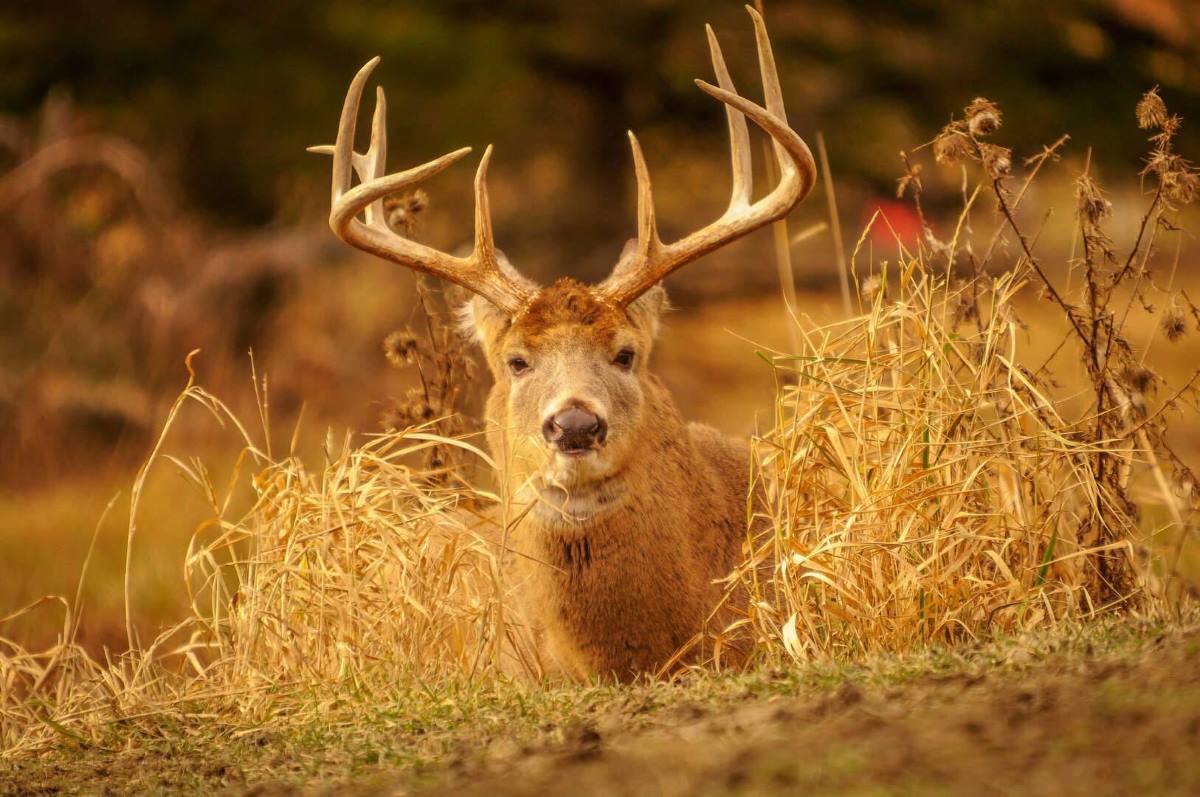When the Pressure (Hunting) is High

When the Pressure (Hunting) is High!
I grew up hunting with a great bunch of guys from my church. Most of them were farmers who had plenty of land and enjoyed the company of a city boy and his dad. Deer drives were our method of hunting and with these guys on our team, there were plenty of acres to walk.
I remember the anxiousness of the first drive of the season. My dad and I would get up early and drive to the farm where all of our hunting party had planned to meet. We’d bring crock pots of food for our lunch, plug them in, and start putting together the game plan for our first drive of the season. We’d pick our drivers (people walking through the timber) and talk about safe shooting lanes. The guys that were left were our posters (hunters who stood at the opposite end of the property ready to shoot.) and they would discuss their positions and safe shooting lanes.
When legal shooting hours began, we were moving! It was like Christmas morning! I would be so excited to see what would come running through the timber towards me.
I remember one morning we were pushing a timbered stream bottom. It was thick with brambles and raspberries which made it a great bedding area for deer. Every time we pushed this property, whitetails would come in waves!
As I stood ready by my tree, a group of 20 or more came running straight towards me. I couldn’t believe it! I picked an old broken up buck and a doe out of the herd and made a couple of single shot harvests! As a result, my tags were filled within the first few minutes of the season. Many of or drives ended up just like that. Lots of deer. Many tags filled. And a good number of great stories to tell.
But, as the days of the season wore on and we had those last few tags to fill, our drives would produce less and less. The pressure of our team as well as other hunting parties in the area really forced the deer to make some changes in their routine. We had to work harder and harder to find those last few deer to fill our tags with. But, hey, it’s hunting right!
As I grew up, I got into bow hunting and saw the same thing happen in certain times of the season. Pressured deer aren’t stupid. They will do what they need to do to protect themselves. As a result, it makes it harder for hunters to have success.
If you are hunting in an area where deer are pressured, what do you do? How do you fill your tag when you just aren’t seeing the deer that you usually have seen? What can you do to turn the tables in your favor?
I will share with you what I have learned over my years of deer hunting. Things to know and tactics to use in both bow and gun season. You can have the success you desire if you just know what to do and where to look.
Understanding a Pressured Deer
Let’s get something understood. When it comes to deer vs. man, a man will lose most of the time. You are not as “timber smart” as a deer. You don’t live your entire existence in the woods surviving every day just to see another. Understanding that deer aren’t just dumb animals is a key first step to gaining the edge in the hunting game.
Deer will sense and understand pressure in many ways. When they begin to see an increase in human activity in their area, they will quickly vacate their “home” for another. They may be comfortable in a certain area, but remember, they can survive anywhere.
Along with that, a deer’s sense of smell is incredible. It’s their primary defense and they are constantly using it to assess their environment to make sure it’s safe. If you watch a deer pass through the woods, they are smelling the air, the ground, and even nearby trees, foliage, and branches. Excessive human scent is another item that will send a deer into hiding.
Noises and sounds that are not a normal part of the environment will also alert a deer to something that is “not right”. People walking through the woods making noise, gun shots, machines such as ATV’s, chainsaws, drills, etc. will also make a deer find a new place to live. All this leaves us with a hunting area that has nothing to hunt in it.
If you can reduce your human “stain” on your hunting areas, you’ll have a much better chance at actually seeing the deer that you’d like to harvest. That might be another article topic, but for now, what do we do to harvest a pressured whitetail?
Archery Season
I would boldly say that whitetails are less pressured during the Iowa archery season than the Iowa gun season. However, there are still pressures that can sure make it hard for an archer to successfully fill their tag. Here’s some suggestions that you might consider.
Hunt the Early Season
So many archers key into the coveted weeks of the rut. The time of the season when big bucks loose all sense of logic because they have one thing on their mind. Breeding!
It’s true, though. The rut is going to be a great time to have the opportunity at a mature whitetail. However, MANY other hunters think that too! That will translate into a pressured whitetail who will do what he needs to be safe. Just remember, the rut is not the ONLY time that you can harvest a wall worthy whitetail.
Patterning a whitetail buck in the early season will give you just as much opportunity to be successful. Early summer scouting, using trail cameras, as well as spring shed hunting will tell you where a buck’s home range is. If it’s prior to the rut, you will have a better chance at seeing him in that range.
Pattern and hunt that buck before November. Who knows, you could be relaxing in your home eating venison steak as the weather is getting colder and other guys are dealing with the effects of pressured whitetails.
Move Your Stand
If whitetails are pressured, they are going to change their patterns. They may choose to bed in a new area. Maybe they choose a new food source. They may choose a more secluded part of the timber. One that is deeper with thicker cover that will offer safety and protection.
If you stop seeing deer where you usually do, hopefully you’ve done your homework and might know where they could be found.
Think of alternative travel patterns, bedding areas, and food sources in the area that the deer might switch to. You might set up a camera to see if they are using these new areas. If they are, make a switch! Do it quickly, quietly, and without a whole lot of human effect.
Be Adventurous
Iowa has quite a bit of public land for people to hunt. These areas range from large tracks of land to small pieces that sometimes get overlooked. These are the places that I’m encouraging you to look in to. Small acre parcels, whether public or private, are worth your time to visit and here’s why.
The “average joe” hunter is not going to put a lot of effort into harvesting a deer. They want easy access to and from the timber. That means, they are not usually trekking deep into timber nor are they paying attention to the smaller hunting areas.
I once met a guy in a public timber of about 3,200 acres. He was on his way out of the woods with a climbing stand on his back and a bow in hand. I quietly asked him if he had any luck and his eyes lit up! He told me that he had decided to walk to the very back of the timber’s property that day. As he sat up a stand and had the morning of his life. He wouldn’t tell me exactly what he saw (I don’t blame him), but he said it was worth his time.
A week later, I heard through local talks, that a young guy with a climber killed a 190” buck in the same timber. You see, he had figured out that the pressure on this land was near the parking lot and highway. He knew that if he could get deeper where the deer had not encountered hunters, he might see more activity and he was right!
Go the distance! It might be a long drag if you make a harvest, but that’s what buddies are for!
Gun Season Rotate your Hunts / Properties
I realize that the gun seasons are fairly short. Especially when it comes to shotgun seasons. However, when deer are pressured, you need to be wise with your hunting strategy if you want to fill all the tags you have.
If you are with a party that has lined up a list of properties to perform some drives on, let me propose that you carefully space out and rotate your drives a bit during the days you are hunting.
For example, if you have six different properties to drive, do two or three the first day and be done. Your second day of hunting, do the next two or three and be done. Once you’ve gotten through your properties, rotate back and do the first few again and here’s why.
There’s a good chance that your group is not the only team in the area doing drives. If you can let those properties sit for a few days, the deer from other areas will go into yours and rest. They will notice that there is NO pressure there. If you can give them a day or two without the pressure of being hunted, it will give you the element of surprise on them when you come back to those properties.
If you are choosing to do this, line up a good number of properties to have on your list. That will keep your days full of hunting, but will not over pressure any certain area.
Use your Binos / Spotting Scopes
When hunting in deer drives, small timbers, CRP, and other areas that usually hold deer are going to get “beat up” with hunting traffic. Especially if your group is not the only group hunting those areas. If that’s the case, you need to start looking for areas that you wouldn’t expect to see deer. Fencerows in the middle of a section of farm ground is a good place to start!
Years ago when I used to party hunt during the shotgun seasons, by day two or three, we were spotting the fencerows in the middle of the field. Bucks and does would escape the timber and bed down in these fences. They were often protected from the wind by the grass that had grown up along the fence and they could see for miles with the open fields. If anybody came out towards them, they had the advantage!
If you have permission, you can line up some guys in the right area to handle this scenario. A quick drive down that fencerow will push a deer out for a shot. Sometimes, you can play the wind and cover to walk right up to them for a shot. It’s exciting!
Remember, when deer are getting pressure, it will make your hunt more challenging and difficult. However, it’s not impossible to make a harvest. You just have to “step up” your game and make the extra effort to find them.
When you have success in this situation, it makes your success all the more exciting! You’ll never forget the year that you won the game between you and the trophy on your wall. Good luck!
by Ryan Graden
October 2019
Here are some different whitetail tactics to try out
Or here is the Digital version of this month’s issue of the Iowa Sportsman
Looking for Our Cattle/Dairy Side of Things?


